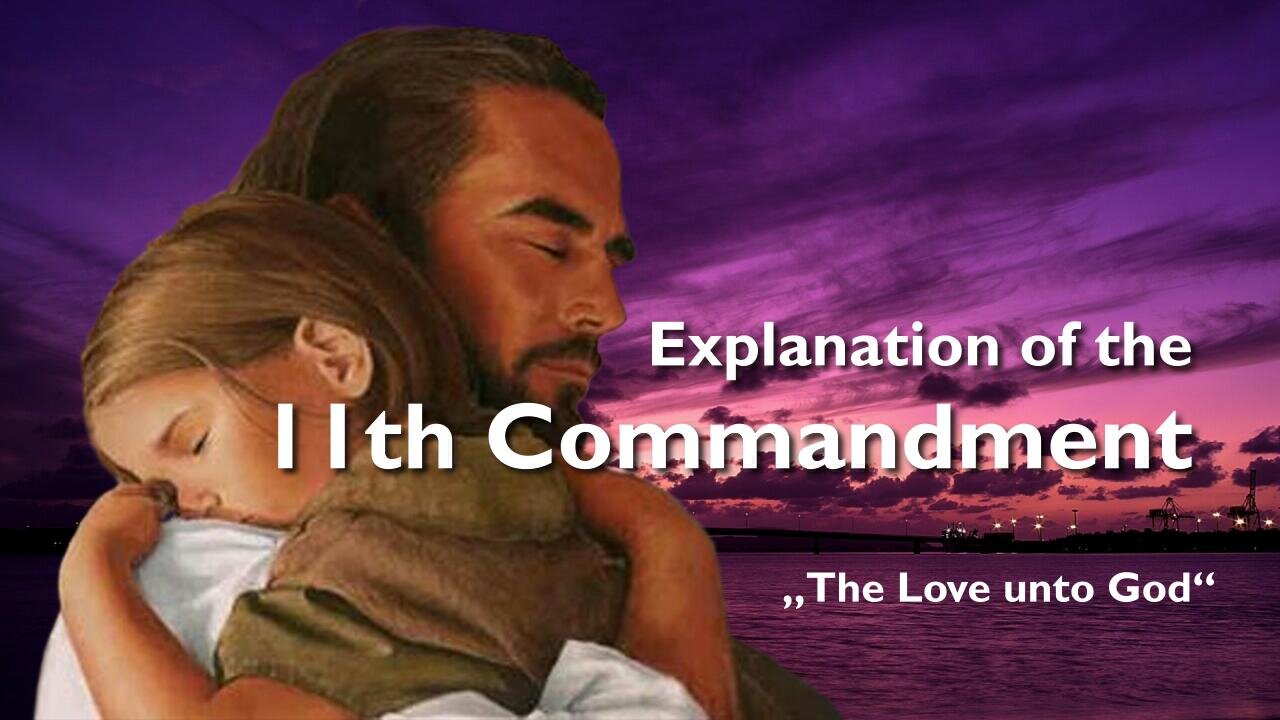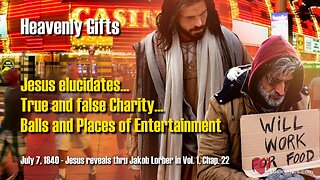Premium Only Content

Commandment 11 ❤️ Love God above all else... But how shall and can I love Him above all else?
Text & Audio to Videocontent & Related Messages... https://jesus-comes.com/index.php/2019/05/09/gebot-11-die-gottesliebe-commandment-11-the-love-of-god/
Channel Overview... https://jesus-comes.com/index.php/2022/10/16/kanalubersicht-channel-overview/
Video Playlist Commandments of God... https://www.youtube.com/playlist?list=PL73-eEs6JmCsw5J2MK1od7SnWFzMmUpBW
Commandments Overview... https://jesus-comes.com/index.php/2015/12/03/erlaeuterung-zu-den-zwoelf-geboten-des-herrn-10-gebote-moses-und-die-2-gebote-der-liebe-jakob-lorber/
Read online... https://search.jesus-comes.com/index.php?title=SSUN2-98
The Third Testament in various Languages... https://jesus-comes.com/index.php/das-dritte-testament-the-third-testament-el-tercer-testamento/
Jesus' Revelations thru Jakob Lorber... https://jesus-comes.com/index.php/category/english/jakob-lorber-pdfs/
Jesus' Revelations thru Gottfried Mayerhofer... https://jesus-comes.com/index.php/category/english/53-sermons-of-jesus/
LoveLetters from Jesus... https://jesus-comes.com/index.php/liebesbriefe-von-jesus-love-letters-from-jesus/
Trumpet Call of God... https://awakeningforreality.com/latest-video-and-audio-letters-neuste-video-und-audio-briefe/
Explanation of the 11th Commandment… ‘The Love unto God’
The Spiritual Sun, Vol. 2
Messages of Jesus Christ on the spiritual life in the Beyond
Given thru the inner word to Jakob Lorber (1842-43)
Millions and Millions of souls from children are mentored, taught and provided for in the ‘Kingdom of the Children’ (Spiritual Sun Volume 2, 67-102).
The Guidance through the ‘Children’s Kingdom’ takes place by the Apostle of Love, John.
Chapter 98
1. We are already in this hall, and here in the middle of it, we also see a round tablet on a large, white, shiny pillar. It shines like the sun, and in its center is written in ruby-red writing:
2. You shall love God your Lord above all, with all your mind and with all your life forces bestowed upon you by God.
3. In addition to this meaning-laden, beautiful solar tablet, we see already grown children, more than the usual amount of the other halls, who, as you may notice, soon look at the table, then talk with their teachers again, and then become absorbed in themselves, their hands crosswise over their chests, standing like statues. The whole scene implies that this is something extraordinarily important.
4. Some may perhaps ask and say: Such would probably be expected. But if one looks at the matter in the correct light, then this commandment written on the solar tablet will say nothing other than what all the previous commandments have basically said together. Why, then, does this tablet here have to shine, while all the preceding ten tablets were simply white and, as usual, inscribed with a dark substance? – This remark is not without content. Nevertheless, it loses its value here, just as all other doctrines and claims against a single word from the mouth of the Lord must necessarily lose their appearance.
5. It is the same situation as is authenticated every single day in the world in the great nature. Suppose how many thousands upon thousands of smaller and sometimes stronger and slightly larger lights shine down from the high heavens to the dark earth every night. The moon itself is often active throughout the night. In addition to these beautiful lights, at night, people on Earth light almost as many artificial lights.
6. With this abundance of lights upon lights, one would think that at nighttime on earth, it would be impossible to bear it all. But experience has always shown that on the earth, after each sunset, it becomes darker as the sun sinks below the horizon, despite the ever-increasing number of lights in the sky.
7. Who can say these lights are not gorgeous? Yes, a mediocre admirer of the wonders of God must, at the sight of the starry sky at night, beat on his breast and say: O Lord, I am not worthy to walk in this, Your sanctuary, in this infinite temple of Your omnipotence! Yes indeed, one can rightfully exclaim every night: O Lord! Whoever looks at Your works experiences a vain desire for them!
8. Why then a vain one? Because every human being has reason enough for himself, out of sheer pleasure and bliss, to be piously vain because He who created such marvels, is his Father!! Thus, everyone has, as it were, a sacred right to rejoice when he looks at the great wonders of his Almighty Father during a night. And indeed, the flame of a lamp and that of the stove are no less a miracle of the almighty Father than the glorious radiance of the countless stars of the heavens!
9. And look now, all of this marvelous admirable splendor likens to the Old Testament in all its parts.
10. We see a barely countable amount of larger and smaller lights in this old nocturnal sky. They radiate splendidly, and whoever looks at them is always filled with a secret, holy reverence. Why? Because his spirit suspects great things behind these lights. But they are still too far away from him. He can look and grab and feel, but the little lights with their great content do not want to move closer to his inquiring spirit.
11. But who are these heavenly lights in the old heaven of the spirit?
12. See, they are all the patriarchs, fathers, prophets, teachers, and leaders of the people who are known to you by the Spirit of God. – But on earth there are also a lot of artificial lights, who are they supposed to be in the Old Testament? These are the worthy people who faithfully lived according to the words that came from the God-saturated men, who throughout their lives enlightened and refreshed their neighbors.
13. So we have this wonderful night scene in front of us. It is true that the nocturnal local storms occasionally obscure the rays of the sky, with clouds drifting rapidly away. But the same storm that once brought a fiery cloud over the glorious star-spangled sky drives this cloud away over the horizon, and after him the firmament becomes purer than it was before. Everything becomes fearful at such a short-lasting storm and wishes again for the quiet, glorious night, illuminated by so many thousands of lights. But a naturalist speaks: Such storms are nothing but ordinary harbingers of the day, so one should not be afraid.
14. That is indeed true. For where large forces are set in motion, one can rightly conclude and say: Here an even greater, yes even the greatest primordial force cannot be far away, for these lesser winds are nothing but side streams of a not-so-distant great hurricane. So our naturalist is right and we are still refreshed by the wonderful splendor of the miracle night.
15. Like lovers we swarm around under the many windows of the big, magnificent house, and look with imaginative and longing chests up to the light-filled openings of the house, dimly lit by a night lamp, behind which we sense the object of our love.
16. Many fantasies, a thousand content-heavy thoughts twitch like shooting stars over our love-heaven, but no such fleeting ephemeral light will suffice to satisfy the thirst of our love.
17. It is the same for the people in the old night sky of the spirit. But what happens? Through the rising of the sun the horizon begins to redden. It gets brighter and brighter over the horizon. One more glimpse of the once so beautiful sky, and what do you see? – Nothing but the disappearance of one star after the other.
18. The sun, the glorious one, rises with its primeval daylight, and no star in the sky is visible anymore, for the one sun has enlightened every heavenly atom with its singular light, something which at night all those innumerable stars together could not manage to do.
19. For the tarrying lover, who had raved in vain all through the night, one window of the for him very meaningful house opens, and from this one window the longed-for object of his heart greets him, and tells him with a benevolent glance more than all his innumerable fantasies and thoughts during the night!
20. Thus we see every day in the great nature, a scene that corresponds perfectly to our spirituality.
21. The moon, like Moses, we see with diminishing and pale light dipping behind the evening mountains, when the mighty sun rises in the morning over the horizon. Whatever had been shrouded in the night in the most mysterious darkness, is now brightly lit before everyone’s eyes!
22. All this is the effect of the sun. And in the spiritual heaven, it is all the effect of the One Lord, the One Jesus, who is the only One God of heaven and of all worlds!
23. What He Himself is in Himself as the Divine sun of all suns, that is also every single word spoken out of His mouth against all countless words from the mouths of enthusiastic patriarchs, fathers and prophets. Countless exhortations, laws and regulations we see in the course of the Old Testament. These are stars and also artificial lights of the night. But then the Lord comes, speaks only one word – and this word outweighs the whole Old Testament.
24. And, for that very reason, this first word appears here in this eleventh hall as a self-luminous sun, whose light illuminates innumerable stars, but it is never necessary for it to make use of the counter-reflection of the stars. For it is the primeval light from which all the countless stars have taken their partial light.
25. And so it will certainly be understandable here, too, why the former ten erected tablets are only white, that is with a dull shimmer, whereas here we see the primordial sunlight, which requires no pre-light and no post-light, but it is all light in itself.
26. Whoever takes this to heart to a certain extent will fully understand why the Lord has said, “In this commandment of love, Moses and all the prophets are contained.” It is certainly said as much as one would of course like to say: In the daylight, therefore, one no longer sees the stars and no longer needs their light, because all their light gets completely overpowered by the single light of the sun. But how the full truth presents itself palpably through all this, you will see soon.
Chapter 99 – The Love of God as the primordial Material of all Creatures
1. The love of God is the primordial substance of all creatures, for without it nothing could ever have been created. This love corresponds to the all-enlivening and generating warmth, and only through this warmth do you see the earth become green beneath your feet.
2. Through heat, the rigid tree becomes leafy, flowering, and the warmth in its essence is what ripens the fruit on the tree. There is not a single creature or thing on the earth’s surface which could have its origin in the total lack of heat.
3. It will be said and argued that ice surely lacks all warmth, and especially the polar ice. With that, the heat will not be able to do much, because at near forty degrees below zero, one would like to know the measuring instrument that could detect some heat there. But I say nothing else than that the scholars of this earth have not yet invented an instrument with which they are able to discern the actual heat from the actual cold matter and precisely determine it. With us, who are in the inner pure knowledge, a completely different measure is introduced and in use.
4. The scientists of the earth begin with the measurement of cold, where water freezes. If at freezing point the actual cold begins, then I would like to know the reason, according to which laws or in which way cold then can increase? Why is a temperature of about four to five degrees below the so-called ice-point still tolerably bearable? But when the thermometer has dropped to eighteen degrees below, everyone will feel the cold very painfully. Can one not, with full rights, say here: Eighteen degrees of cold are therefore more sensitive than four degrees, because at four degrees, apparently more heat than at eighteen degrees prevails. Can one now accept eighteen degrees as complete coldness? Oh no, because you’ve already experienced thirty degrees of coldness. This was even more painful than the eighteen-degree one. Why? Because it contained far less heat than eighteen degrees. But forty degrees will be even more painful than thirty. But is it therefore justified to declare the forty degrees as completely void of heat?
5. But I want to tell you that these are nothing but transitions from heat to cold, and vice versa. Therefore one can accept this much more correct scale:
6. Every thing, every body that can still be heated, cannot be called completely cold, for the amount of heat it has within itself corresponds to its size and density. A lump of ice from the highest north can be melted by the fire, and the water brought to boiling point. If this ice had no inherent heat, it could never be heated.
7. Cold is therefore the property of a being in which there is no longer any warming capacity. Thus, one can justifiably attribute the formation of ice on the North Pole solely to the reaction of heat, where it is threatened by the cold, seizing, contracting and solidifying its bodies so that they can resist the actual cold.
8. Warmth is therefore equal to love, but the real cold is like the real hellish lovelessness. Wherever it wants to appear ruling, the all-enlivening and sustaining love arms itself against it, and the real cold, which kills everything, cannot achieve any victory against the armed love.
9. Therefore, what does “love God above everything” mean? Of course, it cannot possibly mean something other than:
10. Combine your God-given warmth of life with the original creative and preserving warmth of your Creator, and you will never lose your life.
11. But if you want to voluntarily separate your love or your warmth of life from the Divine primordial warmth of life, and want to exist as an independently ruling being, your warmth will have no more sustenance.
12. You will thereby move into an ever greater degree of cold. And the deeper you go down into the ever more powerful, colder degrees, the harder it will be to warm you up again. But if you have gone into the perfect cold, then you have fallen completely prey to Satan, where you are so cold that no more warming is possible!
13. What would then happen to you, no angel of heaven would know what to tell you.
14. In God, of course, are infinite depths. But who will be able to fathom these and keep his life?
15. I think that from this short discussion, one can already quite clearly begin to form an idea of why this commandment, this one word of the Lord, is the epitome, indeed a sun of all suns and a word of all words. We want to talk more about it shortly.
Chapter 100 – What does it mean to love God above all else?
1. I see one who comes and speaks: It would be all right, but how should one realize this one Divine word on God Himself? How could one truly love God, and above all else? Should one be so in love with God like a young bridegroom would be with his beautiful and rich bride? Or should one be in love with God like a mathematician with a mathematical calculation or an astronomer with his stars? Or should one be in love like a speculator with his commodity, or a capitalist with his money, or a sovereign one with his dominions, or even like a ruling monarch with his throne? These are the only possible standards of serious human love, for the children’s love for their parents cannot be properly established as a serious measure of love, as the example teaches that children can leave their parents to either build a good marriage or to gain much money or to take a high honorary position. With all this, the love of the children for their parents steps down and must necessarily take on a more powerful position. Therefore, only the most powerful standards of human love are given here, and then the question is, by which one should one actually measure the love of God?
2. But if now somebody comes and says: With this or that one, I say: friend! That cannot be.
3. It is true that the most powerful measures of love I quoted are probably the only ones according to which man’s greatest power of love can be measured; but it says that one should love God above all, which means as much as: more than anything in the world.
4. So, how does one begin to raise the love to such a potency of which no human spirit can form any measurable or comparable concept? One will say, for example, that one should love God even more than his own life. Here I say in objection: With the love of one’s own life, the highest love for God holds out even less of a comparison than with the love of the children for their parents. Because it is already well known that the children do not risk their lives out of love for their parents; on the contrary, they expect the parents to fight for them to the death.
5. The self-love of children is usually far more powerful than their love towards their parents. But we see, on the other hand, that the children of men often put their lives on the line for the sake of other benefits.One is sailing across the ocean on stormy nights, another is facing the line of fire of the enemys army, and a third often goes to the unstable abysses of the earth to fetch metallic treasures. And so we see that these external worldly-earnest standards of human love are certainly stronger and have a more general applicability than children’s love for their parents and the love of their own lives.
6. But of what use are all these standards, if far above them, the love for God should stand on such a level, against which all other love measures should sink back into pure nothingness? See, my dear friends and brothers, our objector has attacked us sharply, and we will have to stand up with much vigor in order to win against the opponent’s overweight.
7. But I am just seeing another very serious-looking opponent. This one is sure of his victory and says: Oh, we will deal with this objector soon, because the Lord has even given us the explicit standard of how to love God. Therefore, I need say nothing other than what the Lord Himself has said, namely, “He who keeps my commandments, it is he who loves Me.” – This is the actual measure of how to love God.
8. If the objector has enough sharp and strong teeth, he should still try to set up some other unbeatable measure. Good, I say, the objector is still around and makes an effort to bite this objection a bit. So we want to listen to him and see what he’s going to say. He speaks:
9. Good, my dear, friendly opponent! In the presentation of your objection you have shown to me, according to your measure of the highest love of God, nothing other than that you have a fairly good memory by quoting so many texts from the Holy Scriptures. But see, whoever wants to receive life from all the texts not only has to know them but should also be able to vividly perceive their meaning.
10. What would you say, if I spoke to you from the mouth of the Lord Himself, not just one, but several objections, according to which the Lord Himself presents the love from the fulfillment of the law as insufficient? Although you make a face now, as if you want to say: Such texts should probably be sparsely scattered in the Scripture. But I say to you: Dear friend, not at all. Just listen to me, I will immediately show you half a dozen, if you’d like to see.
11. Are you aware of the Lord’s talk with the rich youth? Does he not ask: “Master, what shall I do to achieve eternal life?” What does the Lord answer with? You speak triumphantly: The Lord says, “Keep the commandments and love God, and you will live!” Good, I say, but what does the youth say? He says, “Master, I have kept them since my childhood.”
12. That’s all right. But why, I ask, did the boy give this answer to the Lord? He wanted to tell him this: Although I have kept them all since my childhood, I still feel nothing of the wonderful eternal life in Me.
13. Why does the Lord then declare to the youth that the keeping of the commandments for the attainment of eternal life is insufficient, and also makes a very tremendous addition, saying, “So sell all your goods, distribute them among the poor, and follow Me!
14. Question, if the Lord makes such an addition, is the observation of the laws then the highest love for God? See, there’s a catch, but let’s move on!
15. What does the Lord say to His apostles and disciples when He introduces and preaches to them the duties to be fulfilled? He speaks nothing but the simple, very meaningful words: “When you have done all things, confess that you are lazy and useless servants.
16. I ask you now: does the Lord here declare the obedience to the commandments as sufficient, while He evidently declares that every man who completely fulfills the law should consider himself completely useless? See, there is already a second, even greater catch. But let us continue!
17. Do you know the parable of the Pharisee and tax collector in the temple? The Pharisee joyfully gives himself the faithful testimony before the sanctuary, that he, unlike many others, has fully fulfilled the law of Moses in all its aspects. The poor publican in a remote corner of the temple, in his immensely humble position, faithfully shows to every observer that he did not manage to fulfill the conditions of the Mosaic Law, for he dares not even to look up to the sanctuary of God due to his many sins, but confesses even his worthlessness before God and pleads for mercy and grace.
18. Surely I would like to know about you, my dear literal friend, why, if the law is sufficient, the Lord lets the Pharisee, who strictly observes the whole law, leave the temple unjustified, all the while letting the poor, sinful publican leave the temple justified?
19. See, if you look at this in the right light, it seems as if the Lord Himself has created a third great catch with the strict observance of the law. You now shrug and do not know what you should make of it. Do not worry about it, it gets even better! So let us continue.
20. What would you say, if I would quote to you from the Scriptures, and indeed from the mouth of the Lord Himself, a text, according to which He indirectly invalidates the whole law and sets a completely different aid, through which He alone guarantees the acquisition of eternal life?
21. You speak now: Good friend, I also want to hear this text. You shall have it soon, my dear friend! What does the Lord say when He found a child by the wayside, picked him up, pressed him to His heart and cuddled him? He says: “If you do not become like this child, you will not enter the kingdom of heaven!”
22. Question: Did this child, who had barely spoken a few words, ever study the laws of Moses and then strictly arrange his life accordingly? There is no person in the world so stupid who could say that. Ask therefore: How could the Lord here designate a child who had never dealt with the law of Moses before as the supreme motive for the gaining of eternal life? Friend, I’ll say nothing more than this: try to raise an objection against this. You are silent. So I see that with your lineup you have already retreated quite far into the background with this fourth catch.
Chapter 101 – What does the Love for God consist of?
1. You have seen in these four points that the Lord, on the one hand, does not present the sole obedience to the law as sufficient for the attainment of actual eternal life, and, in the fourth point, even indirectly abolishes it.
2. But what would you say, if I would cite a few points where the Lord even spoke rebukingly about the observance of the law? You say here: That cannot be possible! For that, I can offer you not just one, but, if you wish, several examples. Hear!
3. Anyone who has studied the Mosaic Law only to some degree must know how much Moses commanded hospitality to the Jewish people. Those who turned against hospitality were declared worthy of punishment before God and before men. The law of hospitality was all the more intensified for the Jewish people who were very prone to greed, in order to protect this people from self-love and greed, and to lead them to charity.
4. The law, therefore, was to receive and serve a foreign guest with all attentiveness, especially if he belonged to the Jewish nation; and this law was from God; for God, not Moses, was the Lawgiver.
5. But when the very same Lord, who had once given the laws through Moses, comes to Bethania into the house of Lazarus, Martha is there ,law-abidingly, and offers all her strength to serve this most worthy guest with due respect. Mary, her sister, forgets about the law out of sheer joy for the exalted guest, sits down idly at His feet and listens with the utmost attention to the stories and parables of the Lord. Martha, somewhat upset about her sisters inaction and obliviosness of the law on this occasion, turns herself eagerly to the Lord and says, “Lord! I have so much to do, would you bid my sister to help me a little! “Or, to be more clearl, Master, You, the Founder of the Mosaic Law, do remind my sister to be obedient.
6. What is the Lord talking about here? “Martha, Martha!” He says, “you’re worried about worldliness! Mary has chosen the better part, which will never be taken from her.
7. Tell me now, my dear friend, whether this is not an obvious censure of the Lord against the zealous and exact observance of the law, and, on the contrary, an extraordinary commendation of the person who, to a certain extent, does not care about the whole law, but rather speaks through her actions (Maria):
8. Lord, when I have You, the whole world is not worth anything to me! Does the Lord not again show that the observance of the law alone does not give anyone the better, and especially not the best part, which would never be taken from him? See, that is a fifth catch. But let us move on!
9. What does the Lord Himself say to Moses, in the third commandment, “Thou shalt sanctify the Sabbath”? Question, what does the Lord Himself do in the face of His literal fulfillers of the law? See, He goes forth and desecrates the Sabbath Himself, apparently according to the literal sense of the law, and even allows His disciples to reap ears on a sabbath day and to satiate themselves with the grains. How do you like this observance of the law of Moses, where the Lord Himself, as it were, does not only desecrate the whole Sabbath for Himself, but to the greatest annoyance of the literal law-enforcers? You will say that the Lord could do that, because He is also a Lord of the Sabbath.
10. Good, but I ask: Did the angry Pharisees know that the carpenter’s son was Lord of the Sabbath? – You think they should have recognized His miracles. But then I say: marvels were not enough for these people to discern the perfect divinity in Christ, for all the prophets worked miracles at all times, the true ones as well as sometimes the false ones. One can therefore not assume that the miracles of Christ should have convinced the Pharisees of His Divinity and glory.
11. But all the prophets, except for Him, sanctified the Sabbath. He alone overthrew it. Would that not have been a nuisance to the literal law-abiders? Certainly, and yet the Lord did not stop with His activity.
12. But what does it mean? Nothing other than that the Lord sets the observance of the law at the very bottom. Why? A little parable out of your own sphere, like of the sphere of every man who has ever lived in the world, will bring you the answer:
13. A father has two children. He has announced his will as law to these children. He showed them a field and vineyard and said, “You have become strong, and so I demand of you that you diligently work for me in the vineyard and the field. From your work I will know which of you loves me the most.” Well, that is the law, according to which, of course, to the son who loves the Father most, would be given more glory.
14. But what are the two sons doing? The one takes the spade and persistently tills the earth all day long and tills the field and the vineyard. The other one is working at his leisure, as one would say. Why? He says: When I am in the field or in the vineyard, I must always bid my dear father farewell, besides, I am not as glory-hungry as my brother. When I have my dear father, who is everything in my heart, when I can be around him, I do not ask for much or for one or the other allotment of glory.
15. The father also says to his second son from time to time: but see how your brother works diligently and seeks to earn my love. But the son says, O dear father! When I am in the field, I am far from you, and my heart does not give me rest, but always speaks aloud to me: Love does not live in the hand, but in the heart, therefore it does not want to be earned with the hand, but the heart. Father, give my brother, who works so diligently, the field and the vineyard. I am sufficiently provided for by you, if you will only allow me to love you to my heart’s content at all times, as I want and must love you, because you are my father, my all.
16. What will the Father then say, and that from the innermost depth of his heart? Certainly nothing other than:
17. Yes, my dearest son, you have revealed your heart to me; the law is just a test. But my son, love, is not in the law, for everyone who keeps the law alone keeps it out of self-love in order to earn my love and glory with his energy. But the one who keeps the law is still far from My love, because his love is not attached to Me, but to the reward.
18. But you have turned back, you may not disdain the law, because your father gave it, but you have risen above the law, and your love has led you back to your father. So then your brother should receive the field and the vineyard and enter into my glory; but you, my dearest son, shall have what you have sought, the Father Himself and all His love!
19. I think, my dear friend, it will be obvious from this parable what is better, that dry abiding of the law, or to pass it over and embrace my love.
20. If all is not completely clear to you yet, I ask you: if you had the opportunity to choose a bride out of two virgins, of whom you would be convinced that both love you, but you are not yet completely sure which one loves you the most. Would you not very much wish to find out who does love you the most, to choose the one who loves you most? You say: That’s very clear, but how do I find out? That we’ll come to know shortly.
21. See, you come to the first one. She is busy and active. Out of love for you, she does not mind all the hard work she does for you, because she makes shirts, socks, nightgowns, and more such clothing for you. She has so much to do, that not seldom, because of all the work, she is hardly aware of you when you come to her. See, that’s the first one. – The second one works very casually. She also does things for you, but her heart is too busy with you to give her attention to the work. If you visit her, and she sees you coming from far away, there is no talk of working, because then she knows nothing higher, nothing more commendable than you alone! You alone are her all in all, for you she would give the entire world! Tell me, which of the two will you choose?
22. You say: Dear friend! The second one is dearer to me, because why would I care about a few shirts and stockings? Obviously it can be seen here that the first one seeks to earn me only by forcing me to acknowledge her merit. The other, however, seeks to love me. She is beyond merit and knows nothing higher than me and my love. I would take the second one for my wife.
23. Well, I tell you, my dear friend, do you not see clearly the nature of Martha and Mary here? Do you see what the Lord is saying to the law-abiding Martha and what to the idle Mary?
24. But from this you can also see what the Lord demands of every human being beyond the law, and at the same time tangibly reveals what mans love for God consists of. For just that very reason the Lord even curses, upset in his heart, the literal observer of the law (the Pharisees and the scribes), praises the sinful publican, and makes the kingdom of heaven more accessible to the thieves, whores, and adulterers than the dry slaves of the letter
25. Therefore I ask the objector now with the fullest right once again, according to which measure one should love God above everything? If I have the measure, then I have everything, but if I do not have the measure, then I love as someone who does not know what love is. So again the question:
26. How should one love God above all else? – And I, John, say: To love God above all means:
27. To love God beyond all law! – How to do this shall be made clear shortly.
Chapter 102 – How to love God above all else
1. But in order to know and understand thoroughly how to love God beyond the law, one must know that the law in and of itself is nothing but the dry way to the true love of God.
2. He who begins to love God in his heart, has already traveled the way; but whoever loves God only through the obedience of the law, is still a traveler with his love on the way, where no fruit grows and not infrequently robbers and thieves of the wanderer wait.
3. But whoever loves God purely, loves Him above all else! For to love God above all means to love God beyond all law. Whoever is out on the way, must go on, step by step, in order to reach, in the most painstaking manner, the goal set for him. But he who loves God fully, skips the whole way, that is, the whole law, and he loves God above all else.
4. One could probably say here: That sounds odd, for according to our concepts “to love God above all” means to love God more than everything in the world. – Good, I say, and I ask at once: What measure does man have to measure such a love? The Objector has very clearly differentiated all these measures for the highest possible love of man upon earth, and has also shown that man does hereby indeed not have a measure for the above-all-love for God.
5. But I say: Is not everything explained by the given law, how man has to behave in his desire for worldly things? All things are therefore represented in the law, and besides that, for the love of man, the just limitation is given, according to which every man has to behave towards worldly things.
6. But if somebody loves God beyond the law, he certainly loves him beyond all worldly things, because, as I have just said, the use of worldly things and the attitude towards them, according to the Divine order, are represented by the law. A short addendum in a comparative position will make the whole thing as clear as daylight.
7. The Lord speaks to the rich youth: “Sell everything, distribute it among the poor, and follow Me!” – What does that mean? In other words, if you, young man, have observed the law, then rise above it, return all laws and all things to the world, and you stay with Me, then you have the life!
8. Who will now not know what it means to love God beyond the law?
9. The Lord continues to speak to the disciples: “If you do not become like little children, you will not enter the kingdom of God.” What does that mean? Nothing other than this:
10. If you are not like this little child, not caring about anything in the world, neither the law nor the things of the world, coming to Me and taking hold of Me like this child with all love, you will not enter into the kingdom of God! Why not? Because the Lord Himself speaks again: “I am the way, the truth, and the life!” So whoever comes to Me, who is completely one with the Father, must enter through Me into the stable or the kingdom of God.
11. As long as one does not embrace the Lord Himself, he cannot come to Him, even if he had, like a rock, observed a thousand laws without fail. For whoever is still on the way is not yet with the Lord, but whoever is with the Lord, what does he still have to do with the way?
12. But here among you there are fools, many hundreds of thousands, who hold the way much higher than the Lord. And when they are already with the Lord, they turn back and move away from Him once more, to be on the wretched way! Such people enjoy subjection, slavery, and the hard yoke more than the Lord, who makes every man free. His yoke is exceedingly light and His burden is gentle. Light is the yoke, so that in the course of your life, your love for the Lord will not press your neck, and the burden will be gentle, which is the sole law of love! – Next we will look at an example.
13. The just Pharisee praises himself by the wayside; but the tax collector finds the whole way quite difficult. For he will never be able to oversee his goal. He therefore bows down deeply before the Lord in his heart, realizes his weakness and inability to walk the path. But he embraces God the Lord with his heart and thereby makes a great leap over the whole arduous way and thereby reaches his goal!
14. Who will not reach out with his hands and realize what “to love the Lord above all things” means? – So let’s move on. The Martha is on the way, the Maria at the goal! One hardly needs to say more about it, for it is obvious and clear here what “loving the Lord above all things” means.
15. But if we want to make the matter clearer, let us look at the scene where the Lord asks Peter three times if he loves Him? – Why does He ask him three times? For the Lord knew anyway that Peter loved Him, and He also knew that Peter would answer all three questions with the same heart and the same mouth. The Lord knew that. It is not for this reason that He asked Peter this question, but that Peter should confess that he is free and loves the Lord beyond all law. And so the first question means: “Peter, do you love Me” – Peter, did you find Me on the way? – Peter affirms this, and the Lord speaks: “Feed my sheep”! that means: Teach also the brothers to find Me! – The second question: Peter, do you love Me? That means: Peter, are you with Me, are you at the door? – Peter affirms this, and the Lord says, “So feed My sheep!” Or: So bring the brethren to be with Me at the door to life! And for the third time the Lord asks Peter: “Do you love Me?” That means as much as: Peter, are you beyond all law? Are you in Me like I am in you? Peter apprehensively affirms this, and the Lord speaks again: “So feed My sheep and follow Me!” That means as much as: So you may also bring the brothers, so that they are in Me and live in My order and love, just like you.
16. For following the Lord means living in the love of the Lord. I think to say more about what “to love God above all things” means, would be superfluous. And since we now know this and have recognized the Light of lights, we will immediately go to the twelfth and last hall.
-
 8:38
8:38
Jesus' Revelations thru Jakob Lorber English
1 year agoTrue and false Charity... Balls and Places of Entertainment ❤️ Jesus Christ reveals Heavenly Gifts
226 -
 LIVE
LIVE
GritsGG
11 hours agoBO7 Warzone Is Here! Win Streaking! New Leaderboard?
49 watching -
 LIVE
LIVE
VapinGamers
3 hours ago $0.07 earnedDestiny 2 - Star Wars Renegade Lightsabers Oh My! - !rumbot !music
128 watching -
 2:13:17
2:13:17
TheSaltyCracker
4 hours agoPipe Bomb Bull Sh*t ReeEEStream 12-05-25
81.8K164 -
 LIVE
LIVE
DannyStreams
2 hours agoBF the WZ
20 watching -
 LIVE
LIVE
Finfante
3 hours ago*Interactive Stream* Something is WRONG. (Dane Jonson). | LIVE INDIE HORROR NIGHT
31 watching -
 21:51
21:51
DBoss_Firearms
9 hours agoHeaded to The Gathering with some friends!
3.37K -
 58:48
58:48
Flyover Conservatives
22 hours agoUnmasking Antifa: Inside the Red–Green Revolution Aimed at the U.S. Constitution - Kyle Shideler | FOC Show
9.01K26 -
 55:26
55:26
Sarah Westall
3 hours agoJobs Losses Hit the Millions, Real Estate Nightmare, Repo Markets, & more w/ Andy Schectman
20.9K9 -
 1:32:12
1:32:12
Glenn Greenwald
8 hours agoGlenn Answers Your Questions on an Un-American Candidate in TX, Escalating War with Venezuela, Trump's Loyalty to Miriam Adelson, and More | SYSTEM UPDATE #554
108K56